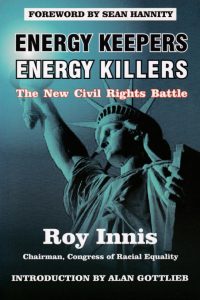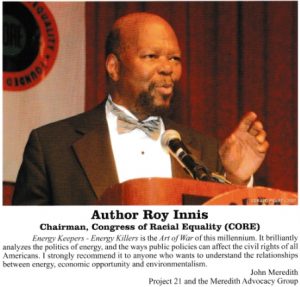AFFORDABLE ENERGY
Mission: Define & Implement Principles of Affordable Energy
POLICIES, ISSUES & ACTION AGENDA
-
Educate citizens of all ages about the critical, life-sustaining functions of abundant and affordable energy in the lifestyles of free societies.
-
Promote the rationale described in Roy Innis’ book that “Affordable Energy” is a “human/civil rights” requirement and that government must ensure it always available.
-
Provide historic information to show that affordable and abundant energy has made America great in the past and that low cost power was a vital element in winning WWII and the Cold War.
-
Define “affordable energy” for Nevada citizens in the statutes and advocate for implementation by the Executive Branch.
-
Work to establish the maximum citizen electricity rate to be 50{4dbcca007145f141f20e946969c983518eb28ccc51b99ee288767f9853e910df} less than current rates, or lower, as soon as possible; but, not later than January 1, 2025.
-
Promote unrestricted “all the above” energy developments in Nevada and work to eliminate state, federal, industrial, legislative and political restrictions for exploring, developing and delivering products using Nevada’s nuclear, fossil, geo-thermal, solar and wind energy resources.
-
Support new regional policies for implementing county-sponsored and widely used Electro-Magnetic Pulse (EMP) and cyber war shielded, MicroGrid energy controlling technology to provide independent, tamper-proof, life-sustaining, minimum-essential, backup power to Nevada communities when the National Electric Grid goes dark for extended periods.
-
Help sponsor state and federal legislation to ensure that long-term, low-cost, distributed, walk-away safe, emissions-free, sealed, tamper-evident, terrorist-shielded, water-free cooling and up to 30-year, un-refueled burn up of nuclear waste by advanced nuclear power systems are included in the list of approved renewable/carbon-free portfolio systems.
-
Help ensure the new, advanced reactor power systems are allowed to be licensed and installed anywhere in Nevada with no more regulatory constraints or favorable tax benefits than other types of power plants.
-
Advocate for establishing the construction of Carbon-Free Energy plants in Nevada to sell over the Grid to states who have high levels of RPS power standards but are not allowing such energy to be produced in their states.
-
Sponsor Nevada summit meetings, industry symposiums, technical workshops and educational forums to identify how to rapidly implement Affordable Energy goals within the state by October 1, 2020.
-
Lead the efforts to obtain Nevada and adjoining state Native Indian Tribal support for these clean energy policies and agenda that will significantly benefit all Nevada and most adjoining state residents.
This Subcommittee’s source of inspiration, policies and actions is “Energy Keepers, Energy Killers, The New Civil Rights Battle” by Roy Innis. It is believed to be the most comprehensive, accurate and authoritative book ever published about the critical shortages, lifestyle impacts, and civilization degradation due to the lack of “affordable energy” for poor, minority and disadvantaged Americans.
That book was a harbinger for helping to expose the critical foundation required for restructuring and rebuilding the domestic energy policies set by bureaucratic, inefficient and conflicted government leaders. But, until NevadansCAN Network decided to sponsor this historic work, few grassroots citizen organizations have been willing and able to directly challenge the status quo.
Energy prices must be significantly reduced in the near future to achieve success for this critical lifeblood of modern civilization, vital element of American industrial power, and key to personal successful pursuits of happiness. Affordable energy must become an essential goal of elected officials and Public Utility Commissions. Under this subcommittee, our citizens will be organized to become capable of demanding much more affordable energy in the future.
It seems clear that we citizens must readily accept and actively promote Roy Innis’ challenge and refuse to accept the high levels of unreasonable energy conservation and “skyrocketing energy prices” as projected by uncaring and conflicted politicians.
This publication should be a “must read” by individuals involved in setting and managing domestic energy policies. And, as Roy Innis has declared, affordable energy is the American Civil Rights priority for the 21st Century. Compelling evidence for the book’s claims and recommendations are well documented.
Below the cover images is a full quote of the book’s “Preface”. It serves as the overview of this subcommittee’s work. But, to gain the full benefits of this historic publication, it should be read.
Back:



